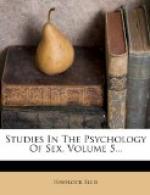It is to the extreme individualization involved by the developments of erotic symbolism that the fetichist owes his morbid and perilous isolation. The lover who is influenced by all the elements of sexual selection is always supported by the fellow-feeling of a larger body of other human beings; he has behind him his species, his sex, his nation, or at the very least a fashion. Even the inverted lover in most cases is soon able to create around him an atmosphere constituted by persons whose ideals resemble his own. But it is not so with the erotic symbolist. He is nearly always alone. He is predisposed to isolation from the outset, for it would seem to be on a basis of excessive shyness and timidity that the manifestations of erotic symbolism are most likely to develop. When at length the symbolist realizes his own aspirations—which seem to him for the most part an altogether new phenomenon in the world—and at the same time realizes the wide degree in which they deviate from those of the rest of mankind, his natural secretiveness is still further reinforced. He stands alone. His most sacred ideals are for all those around him a childish absurdity, or a disgusting obscenity, possibly a matter calling for the intervention of the policeman. We have forgotten that all these impulses which to us seem so unnatural—this adoration of the foot and other despised parts of the body, this reverence for the excretory acts and products, the acceptance of congress with animals, the solemnity of self-exhibition—were all beliefs and practices which, to our remote forefathers, were bound up with the highest conceptions of life and the deepest ardors of religion.
A man cannot, however, deviate at once so widely and so spontaneously in his impulses from the rest of the world in which he himself lives without possessing an aboriginally abnormal temperament. At the very least he exhibits a neuropathic sensitiveness to abnormal impressions. Not infrequently there is more than this, the distinct stigmata of degeneration, sometimes a certain degree of congenital feeble-mindedness or a tendency to insanity.
Yet, regarded as a whole, and notwithstanding the frequency with which they witness to congenital morbidity, the phenomena of erotic symbolism can scarcely fail to be profoundly impressive to the patient and impartial student of the human soul. They often seem absurd, sometimes disgusting, occasionally criminal; they are always, when carried to an extreme degree, abnormal. But of all the manifestations of sexual psychology, normal and abnormal, they are the most specifically human. More than any others they involve the potently plastic force of the imagination. They bring before us the individual man, not only apart from his fellows, but in opposition, himself creating his own paradise. They constitute the supreme triumph of human idealism.
FOOTNOTES:
[64] Binet, Etudes de Psychologie Experimentale, esp., p. 84; Krafft-Ebing, Op. cit., p. 18.




